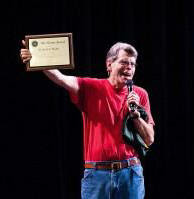Stephen King offers insights on writing horror fiction

Best-selling author Stephen King wowed the crowd at George Mason University’s Center for the Arts in Fairfax Friday evening in a lecture that touched on what inspired him to write horror fiction, the impact of fame, and a preview of works in progress.
The event was the finale of the 2011 Fall for the Book Festival, which included literary events across Fairfax County. City of Fairfax Mayor Robert Lederer presented King with the Mason Award, which recognizes authors who have made extraordinary contributions to bring literature of a wide reading public.
King says he is often asked what his childhood was like. “What they really mean,” he says, “it what fucked you up so badly that you turned out like you did?”
He actually had a fairly normal childhood, King says, although his favorite book at age 8 was Dr. Jekyll and Mr. Hyde. And, he recalls, his mother used to say, “Think of the worst thing that could happen. Whatever happens will be better than that.” And that became “my mantra,” King said.
He explained how that works by scaring the audience with a creepy scenario that began by telling them: “There’s a one in 50 chance that one of you left your car unlocked. And there’s an even smaller chance that that there’s a psychotic out there trying car doors.”
King said it’s that kind of fear of the unknown, blended with incidents from his life, that inspired his writing. He says Stand By Me was based on events from his childhood, and the idea for Cujo came from an incident when he was threatened by a huge Saint Bernard at the house of a man whom he asked to repair his motorcycle. “Lucky just doesn’t like you,” the man told King.
The idea for The Green Mile came from a vision of a guy in prison pushing a cart along a green corridor. And the novel, It, began with the creaky sounds his boots made on a wooden bridge, which reminded him of the story of the “three billy goats gruff” who were terrorized by a troll under a bridge.
King said he is often recognized by the public as someone famous, but people frequently mistake him for someone else, like Stephen Spielberg or Francis Ford Coppola. When that happens, he tends to agree with them. “The low point of my life,” he said was when he was stricken with Montezuma’s revenge during a book tour for The Dead Zone and “a washroom attendant who was 150 years old came up and asked me, ‘aren’t you Stephen King? I saw you on A.M. Pittsburgh.’ ”
King read a selection from a work in progress, “The Tribe,” about some scary old-looking people who drive around in RVs and suck the psychic energy out of people.
At the end of his talk, King answered questions from the audience. When asked if he believes in ghosts, he called himself a“ghost agnostic.”
Another audience member asked about the influences of his early reading experiences. King said his biggest motivating force was horror comics from the 1950s. An avid reader, he said he would read a book that wasn’t that good and think, “I can do better than that.” He also was influenced by Edgar Allen Poe, the horror stories of H.P. Lovecraft, and Lord of the Flies.
When asked which of his characters he can relate to the most, he cited Paul Sheldon from Misery. And the character with which he has the least in common? It’s Big Jim Rennie, the despicable politican from Under the Dome. And that sparked a comment about politics: “There is so much anger and hate in politics today,” he said. “When you have a president who is considered weak because he’s looking for consensus, something is very wrong.”


Great article. thank you.